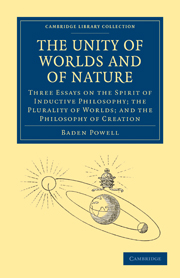 The Unity of Worlds and of Nature
The Unity of Worlds and of Nature Published online by Cambridge University Press: 29 August 2010
Physiology essential to the inquiry
Geology is essentially dependent on physiology; hence any argument derived from the former science, as bearing on the evidence of “creation” in the organic world, must be in some degree an application of the latter; as, indeed, is manifest throughout the foregoing remarks. But some questions are involved in the present inquiry, which depend on a more particular reference to points of pure physiology; and to these the present section relates.
Researches of Cuvier
From the researches of Cuvier, the whole science of comparative anatomy received a vast, and at the time unimagined, extension, in its application to the organic remains of the ancient earth (first systematically carried out by Von Buch), and the recognition of extinct species, allied to existing forms, in what were hitherto imagined to be either relics of legendary monsters and antediluvian giants, or else mere “lusus Naturæ” created by her “plastic powers.”
The intellectual character of Cuvier was equally marked by high powers of generalisation and by a dislike of theorising, or indulging in speculations, as to the causes of the phenomena observed. Yet he inclined, nevertheless, very strongly to the idea of investigating organised structures on the principle which he termed “conditions of existence,” or what has been since called “teleology.”
To save this book to your Kindle, first ensure [email protected] is added to your Approved Personal Document E-mail List under your Personal Document Settings on the Manage Your Content and Devices page of your Amazon account. Then enter the ‘name’ part of your Kindle email address below. Find out more about saving to your Kindle.
Note you can select to save to either the @free.kindle.com or @kindle.com variations. ‘@free.kindle.com’ emails are free but can only be saved to your device when it is connected to wi-fi. ‘@kindle.com’ emails can be delivered even when you are not connected to wi-fi, but note that service fees apply.
Find out more about the Kindle Personal Document Service.
To save content items to your account, please confirm that you agree to abide by our usage policies. If this is the first time you use this feature, you will be asked to authorise Cambridge Core to connect with your account. Find out more about saving content to Dropbox.
To save content items to your account, please confirm that you agree to abide by our usage policies. If this is the first time you use this feature, you will be asked to authorise Cambridge Core to connect with your account. Find out more about saving content to Google Drive.